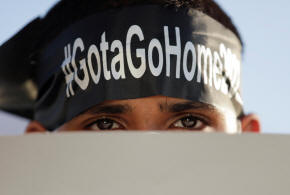|
The
president and his elder brother, Prime Minister Mahinda
Rajapaksa, will stay on despite demands from protesters and the
opposition for them to quit. Rajapaksa has governed the South
Asian island nation since 2019 with numerous other family
members in top government positions.
The island nation of 22 million is experiencing prolonged power
cuts and fuel and medicines shortages triggered by a tumble in
its foreign exchange reserves that has stalled imports of
essentials, leading to daily protests in the commercial capital
Colombo.
The government is set to begin talks with the International
Monetary Fund (IMF) on Monday for a loan programme, and analysts
have flagged political instability as a risk to Sri Lanka
finding a way out of its financial turmoil.
In a speech to his new cabinet, President Rajapaksa said he
would seek solutions to Sri Lanka's problems including via
possible constitutional changes, according to a statement issued
by his office.
"I stand ready to support parliament on constitutional changes
that should be made," he said.
Thousands of Sri Lankans have been protesting outside the
president's office in Colombo for over a week, demanding that
the Rajapaksas resign.
Faced with growing popular unrest Rajapaksa dissolved his
previous cabinet earlier this month and invited all parties in
parliament to form a unity government, but opposition groups and
members of the ruling alliance rejected the idea.
On Monday only five members of the previous cabinet were sworn
in again, while most other portfolios were allocated to members
of the ruling Sri Lanka Podujana Peramuna party.
Among those not re-appointed from the previous cabinet were two
more of the president's brothers, Basil and Chamal, and the
prime minister's son Namal.
"It is the government's responsibility to put the economy on the
right path and build a country that can achieve the aspirations
of the younger generation," the president said.
Economic mismanagement by successive governments weakened Sri
Lanka's public finances, but the situation was exacerbated by
deep tax cuts enacted by the Rajapaksa administration soon after
it took office in 2019.
Key sectors of the economy, particularly tourism, were then
battered by the COVID-19 pandemic, while the government dragged
its feet on approaching the IMF for help.
Last week, the country's central bank said it was unilaterally
suspending external debt payments, instead using the paltry
foreign reserves of around $1.93 billion for importing essential
goods.
(Reporting by Uditha Jayasinghe and Devjyot Ghoshal; Editing by
Raju Gopalakrishnan and Hugh Lawson)
[© 2022 Thomson Reuters. All rights
reserved.]
This material may not be published,
broadcast, rewritten or redistributed.
Thompson Reuters is solely responsible for this content.

|
|





